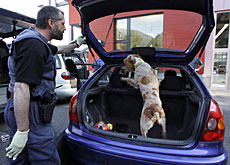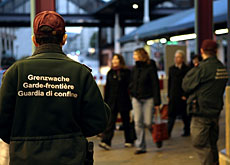Experts tackle airport drug smuggling

More than 100 European experts are gathering in the Swiss capital, Bern, on Monday for a three-day meeting on fighting drugs smuggling at airports.
The annual conference comes at a time when cocaine trafficking gangs in Europe are becoming increasingly well organised, the Swiss authorities say.
The customs and police officials in attendance are members of the Cooperation Group on Airports and General Aviation, which is part of the Council of Europe’s anti-drugs smuggling forum, known as the Pompidou Group.
The meeting in Bern will be discussing cross-border cooperation, in particular rapid information exchange and intelligence gathering. Trafficking risks and zones will also be on the agenda.
Last year Swiss customs intercepted 193 kg of cocaine and 59 kg of heroin at the country’s borders. Also uncovered were 95 kg of cannabis and around 50,000 doses of drugs such as ecstasy and LSD.
Officials say Europe is currently awash with trafficked cocaine, which is being smuggled in by highly professional gangs.
“We have more and more cocaine from the traditional countries such as South America and the Caribbean, but more and more is also coming from West African countries,” Andrea Canonica, head of the Federal Customs Office’s anti-drugs smuggling unit, told swissinfo.
“Europe is an attractive market. There is some space in the market and the prices are quite interesting, higher than in other countries. People can afford to pay for cocaine,” he added.
International anti-smuggling operations have already been carried out, with large amounts of illegal substances being confiscated. Airports are particular targets for smugglers.
Tough opponents
Canonica said customs officials often faced tough opponents, as smugglers were very sophisticated, especially when it comes to concealing items. They also have a lot of cash to back up their operations.
“The classic method is the double suitcase [hidden compartments in false bottoms or sides] but we have even seen electronic equipment modified to hide drugs,” said Canonica.
“We have had pieces of computers and functioning computers with enough space inside them to hide drugs.”
Tougher security measures imposed by the European Union earlier this year after terrorist attacks threats in Britain – as well as those after the September 11, 2001 attacks on the United States – appear to have little impact on drugs smuggling.
“We can’t connect the two things because often the security checks are often done for departing passengers and are focused on items other than drugs,” said Canonica.
But he noted that the rise in the number of flights and more globalisation – meaning that more freight, people and parcels are moving around – had resulted in more volume to check.
There is not, however, enough resources. “And everything has to be done faster so it’s a problem for the officers in charge,” added Canonica.
Canonica hopes that the meeting will provide a good overview of what is going on at Europe’s airports in terms of anti-drugs measures, as well as the trends in trafficking.
He pointed out that cooperation between members was already good, but it could be strengthened even further.
“We need to improve the exchange of information and best practices,” he said.
swissinfo
Drug finds: 2006/2005/2004
Cocaine: 193kg/167kg/269kg
Heroin: 59kg/57kg/97kg
Cannabis: 95kg/296kg/157kg
Khat: 690kg/1,322kg/1,235kg
Ecstasy, LSD and amphetamines: 49,500 doses /190,400 doses/180,300 doses
There were 3,192 cases of drug smuggling in 2006, 240 fewer than the previous year.
The Cooperation Group to Combat Drug Abuse and Illicit Trafficking in Drugs, known as the Pompidou Group, is in an international body formed in 1971 on the suggestion of the late French President Georges Pompidou.
It has 35 member states including Switzerland, which joined in 1985.
The group wants to help develop multidisciplinary, innovative, effective and evidence-based drug policies in member states.
It last met in the French city of Strasbourg in November.
Set up in 1986, this group is made up of customs and law enforcement officers from 34 countries.
A sub-unit of the Pompidou Group, its aim is to develop and harmonise tools and systems to improve drug detection in European airports.
It meets once a year and also acts as a forum for the exchange of information on problems and operational practices at European international airports.

In compliance with the JTI standards
More: SWI swissinfo.ch certified by the Journalism Trust Initiative












You can find an overview of ongoing debates with our journalists here . Please join us!
If you want to start a conversation about a topic raised in this article or want to report factual errors, email us at english@swissinfo.ch.